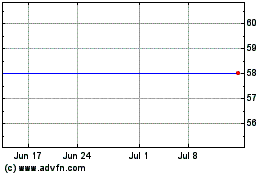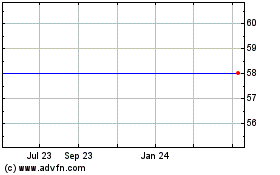Can Aereo Change the Broadcast Game? - Analyst Blog
May 10 2013 - 12:00PM
Zacks
The signal’s still green for Aereo.
Despite several legal challenges, the company which streams
over-the-air TV programs from the cloud continues to grow its
services. The brainchild of CEO Chaitanya (Chet) Kanojia, Aereo has
worked its way around existing legislation which requires cable and
satellite providers to pay license fees to broadcasters. These laws
were enacted by Congress in 1992 and 1999 and fees are paid in lieu
of these service providers retransmitting signals.
Meanwhile, CBS Corporation (CBS), The Walt
Disney Company (DIS), Fox – owned by News
Corp. (NWSA), NBCUniversal – owned by Comcast
Corporation (CMCSA) and ABC are seeing red. So are
Telemundo, also owned by Comcast and Univision. Last month, the 2nd
Circuit Court of Appeals in New York ruled in favor of the internet
start-up. The court said the company’s transmissions and recordings
of major free-to-air networks were not “public performances” of
copyrighted material. Broadcasters have appealed that ruling in the
full 2nd Circuit Court.
Aereo’s modus operandi is a unique one. Somewhere in Brooklyn, the
company has a warehouse with several large “antenna arrays”
connected to the requisite hardware. These in turn in are fitted
with thousands of TV antennas, each about the size of an adult
fingernail. The arrays pick up local over-the-air TV broadcasts and
stream it to subscribers through their Aereo accounts.
These broadcasts, live or recorded can then be viewed on iPhone and
iPads from Apple Inc. (AAPL) and Roku boxes. Next
up is support for Kindle Fire devices from Amazon.com
Inc. (AMZN). You can view these broadcasts using popular
internet browsers like Internet Explorer from Microsoft
Corporation (MSFT)and Chrome from Google
Inc (GOOG), since Aereo’s interface is simply a HTML5 Web
page. Subscribing to Aereo also gives users several hours of
storage, which varies from 20 to 40 hours from a monthly to yearly
subscription.
At first glance, the plethora of mini antennas seems to be
unnecessary. However, there is more than meets the eye here. Each
subscriber is assigned an individual mini antenna. Areo’s major
backer, Barry Diller of IAC/InterActiveCorp (IACI)
describes the situation as “every little antenna having someone’s
name on it.” Of course, that’s not entirely true because if you
decide not to stop using Aereo, the antenna may be assigned to
someone else.
There are several other artificial restrictions which Aereo imposes
on users. Currently, available only in New York, the service is
accessible only within the city’s designated market area. If a user
moves out of that zone, the phone’s GPS or wi-fi will be used to
ascertain this fact and Aereo will switch off reception. This
ensures that the service mimics normal TV reception, where it is
impossible to view over-the-air signals beyond a specific
distance.
And now Aereo has decided to expand its services beyond New York to
Boston. CBS, one of the litigants in New York, has immediately said
it will sue in Boston as well, leading to Aereo taking preemptive
action. A CBS company spokesman has tweeted saying: “Stealing our
signal will be found to be illegal in Boston, just as it will be
everywhere else”. Aereo has responded by filing a declamatory
judgment action in the New York federal court. This is aimed at
preventing CBS from suing Aereo in every jurisdiction where the
company decides to offer its services.
Till now, Aero has successfully circumvented license fees which the
likes of Comcast and DIRECTV (DTV) have to pay
free-to-air broadcasters. But the real challenge to broadcasters
comes from the fact that the nature of the TV industry is possibly
in for a change. Currently, Aereo’s yearly subscription is priced
at $80. A viewer who subscribes to Aereo and other Web based video
services like Netflix, Inc. (NFLX) or Amazon’s
Instant Video Service would end up paying only about $20 a month.
This is far lower than the $100 or more which subscribers pay for
cable TV services.
This would result in a ruinous situation for the networks, who
receive billions of dollars from cable companies as license fees.
The networks have responded in a variety of ways. CBS boss Les
Moonves said on Monday that the company would focus on content
creation and viewed the likes of Netflix as partners. This was
because such over the top providers paid for content. Moonves
believes that streaming companies would bring in a large amount of
incremental revenue.
Moonves believes Aereo is “not a serious threat.” However, NewsCorp
said in April that it may morph into a subscription service if it
loses the legal battle with Aereo. This is the most radical measure
which any broadcaster has threatened to undertake. Even CBS
believes that if the courts do not rule in favor of the
broadcasters, it may have to move over to cable. It is clear that
the television industry is watching this legal battle with keen
interest, since it could threaten its existing model. Clearly,
until a resolution to this legal battle is reached, the future of
free-to-air television remains under a cloud.
APPLE INC (AAPL): Free Stock Analysis Report
AMAZON.COM INC (AMZN): Free Stock Analysis Report
CBS CORP (CBS): Free Stock Analysis Report
COMCAST CORP A (CMCSA): Free Stock Analysis Report
DISNEY WALT (DIS): Free Stock Analysis Report
DIRECTV (DTV): Free Stock Analysis Report
GOOGLE INC-CL A (GOOG): Free Stock Analysis Report
IAC/INTERACTIV (IACI): Free Stock Analysis Report
MICROSOFT CORP (MSFT): Free Stock Analysis Report
NETFLIX INC (NFLX): Free Stock Analysis Report
NEWS CORP INC-A (NWSA): Free Stock Analysis Report
To read this article on Zacks.com click here.
DTE Energy (NYSE:DTV)
Historical Stock Chart
From Jun 2024 to Jul 2024

DTE Energy (NYSE:DTV)
Historical Stock Chart
From Jul 2023 to Jul 2024
